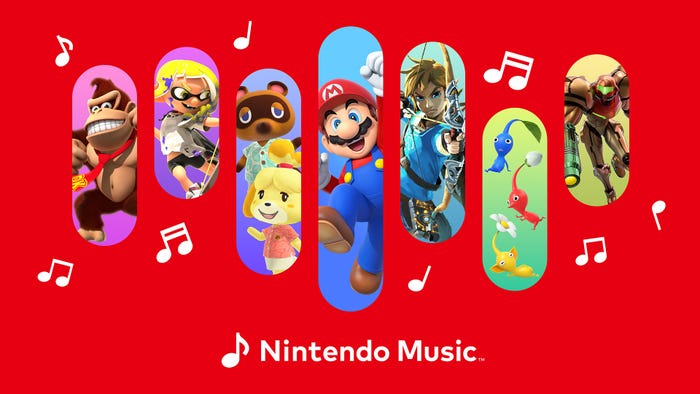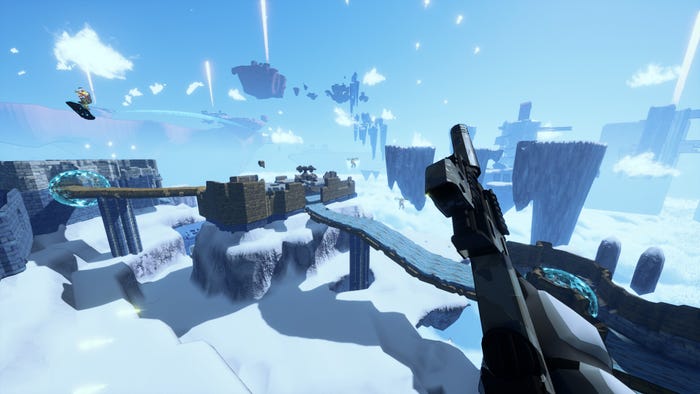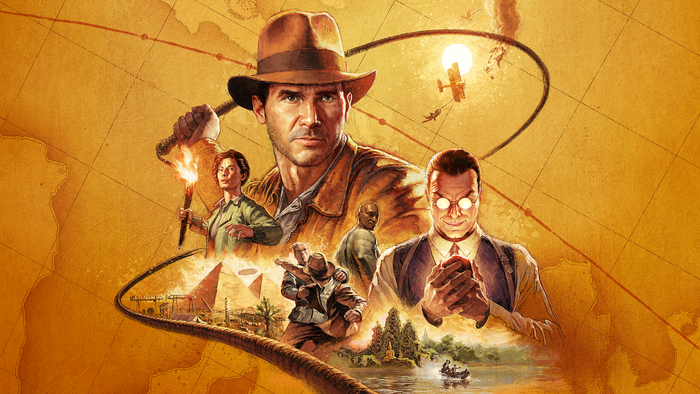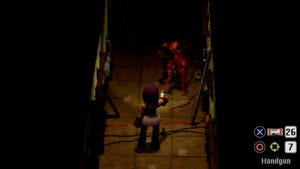Q&A: Corinne Le Roy details the history of Ubisoft Shanghai
"Maybe we seem low-key. But I think we are probably one of the best studios in the world. I think 20% of the company here has more than 10 to 15 years of experience."

Ubisoft Shanghai is one of Ubisoft's largest studios—with over 400 people—and also one of its earliest expansions since the company's humble beginnings. It actually opened prior to Ubisoft Montreal (a whole year earlier, in 1996.) And yet, the studio and its head, managing director Corinne Le Roy, have a lower profile than many would expect. Here, Le Roy fills us in on the trials and tribulations of starting a company from scratch in China in the mid-90s, how the company operates now, and why Ubisoft Shanghai is more than just an asset farm.
Why did you come to China?
Corinne Le Roy: I came to China in 1996 on the request of Yves Guillermot, who at that time wanted to develop the Chinese market and start creating games in China. I started my career here in Ubisoft by publishing Ubisoft games, mainly PC games, in the Chinese market. Since 2002, I've mainly concentrated on development of the studio in Shanghai and supporting the business in China.
Before you came to China, were you at Ubisoft?
No, before I came to China I was with something completely different. I came from public arts—in fact I studied economics, and I became a nurse, a pediatric nurse. I worked for Doctors without Borders, and I was in charge because from early on I loved management. I love supporting people. I love orchestrating things.
"I had developed a location for Doctors without Borders in the former USSR in the 1990s, and Yves Guillemot thought that Russia was probably pretty similar to China at that time. So I came to Shaghai, and I moved from a charity organization to video games."
So I did management for a few years for Doctors without Borders in different countries. I did it in Lebananon, I did it in West Africa, in Syria and I did it for my two last years in south of Russia. So I was in charge of teams in all those different countries. I went back to Paris and I was preparing to do a masters in Public Arts.
I knew Yves [Guillemot] pretty well, and Yves told me, "Don't you want to open Ubisoft for me in China?" I said, "Pardon me?" On one side, I liked it because Ubisoft was very small then, and since I knew Ubisoft from the beginning… still, I didn't expect that he would propose for me to come and develop the comany here. But I was able to develop a location for Doctors without Borders in the former USSR, and Yves thought that Russia was probably pretty similar at that time to China and that I had probably the experience to start Ubisoft here. So I came here and I moved from a charity organization to video games.
Had you been in China before?
No.
What was it like to come to China in 1996 and have to build something up from nothing?
My boyfriend at that time was working in Afghanistan. I leave Paris one day with my suitcase. I start in Pakistan. I went to the border, I went to say hello to him. And I said, "Okay, I'm going to China." I arrived in Shanghai a few days later and book a hotel. Of course very quickly I made a few contacts, because I prepared for the trip before coming here. I had contact with a few people at Intel; I had a few Chinese contacts. I started by recruiting an assistant. And when I had an assistant, step by step we started a company here.
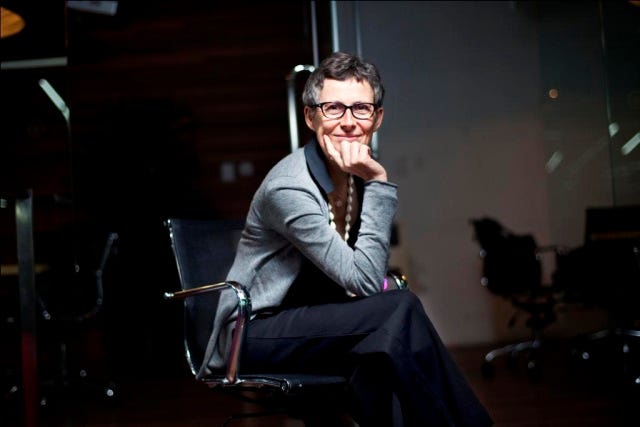 Ubisoft Shanghai managing director Corinne Le Roy
Ubisoft Shanghai managing director Corinne Le Roy
So what was the process of starting a western company in China at that time?
"20 years ago, the PC market was already booming in China. And you would see in any research or studies that within two years, China was going to be the third biggest market in the world."
First, I did two things, because I arrived in April. I knew that I would find a way to set up a company. But first we had three games that we planned to launch in China, and we started localizing them. For the first six months, I had no official company, but I could do things. I could pay translators. So I started with those three first games for the first six months.
Do you remember what those first three games were?
Yeah, it was Rayman. It was Pod, a racing game. And the third one was Kiko [World Football]. So I had those things on track already. And on the other side, I met a consulting firm in town, which was helping us meet with local companies so we could create our own offical company [Ed's note: China generally requires foreign companies have a local partner to legally operate in China] But it was not Yves' plan at that time to set up a joint venture. Week after week, I meet people. I met some Chinese, I met some foreigners who set up companies here, I met some consultants. I knew that it was difficult to open a wholly-owned foreign enterprise. So I made a Chinese friend, who told me, "Okay, if you want I can introduce you to some Chinese officials."
I went to a specific district in Shanghai. I explained who was Ubisoft, what we were doing, what was our plan in China, because in China we were moving two directions at that time already. On one side, it was our team localizing games in Chinese and commercializing those games in China, and two, we wanted to start doing game animations in China. The first secretaries of the Communist party that I met, including the official from the area, were quite interested. As soon as you have that, you have a specific filing to register the company with the official Ubisoft documents that I got from France. And step by step we did the official administrative application to register the company. I started it probably in August and by December 25, 1996, the company was registered and I was able to recruit official employees in China.
"In communist countries, they promoted far more women than we did in the West at that time. Being a woman, I had no problem getting access to anyone at all. "
So over twenty years ago, what was China's interest in having a game developer locally?
Ah, you know but back 20 years ago, the PC market was already booming in China. And you would see in any research or studies that within two years, China was going to be the third biggest market in the world. Then it was the US, UK, Germany, France, but by 1998 China was already the third PC market. When I was making meetings, I'd meet small Chinese developers trying to develop content for PCs. So it was starting. It was obvious that they had things to do and they wanted to develop the PC market. And to develop the PC market, you need content. So from an official point of view, if you want to support a new dynamic media, you want to let new people enter the country. So it was quite easy for me to get support. I
You couldn't speak Mandarin at all?
No, but you know I worked in Russia but was not able to speak Russian. I had an assistant. So we were able to do, you know if I wanted to call someone, she called. If he was speaking English, I will be able to talk to him. If not, she spoke to him. Many people still do that here.
Culturally, is it different to be a woman heading a company in China?
"We distributed our games here via newsstands. The newsstand network was mainly run by mafia guys. I was able to have meetings with them, no problem. They were very happy to have a French person there. They found it fun!"
I used to work in Lebanon. It's not a completely Muslim country—many Lebanese are Christian—but by comparison, here is very easy. Two things. First, Asian countries are more open to the liberation of and support the development of women. Two, in communist countries, they promoted far more women than we did in the West at that time. Being a woman, I had no problem getting access to anyone at all.
For example, when we distributed our games here via newsstands. The newsstand network was mainly run by mafia guys. I was able to have meetings with them, no problem. They were very happy to have a French person there. They liked it! They found it fun, you know?
And I was never obliged to drink, whatsoever, as I don't like to drink. I was able to not smoke whatsoever, despite the fact that they were all smoking around so much that we were discussing things in a cloud. No, I think it was easy.
China is a communist country. How does that change things to be running a multinational company from a country like this?
You know China is a bit schizophrenic. Yes, it is run by the communist party. You have a certain number of rules and regulation on one side. And there are things that you absolutely cannot do. Like today, operating online games in China… forget about it, you can't do it. Otherwise you can do pretty everything here. In terms of the firewall, we have a direct line from here to Hong Kong. And we made our deal for our direct line from here to Hong Kong with China telecom. So we can do it.
That's interesting. Is that normal?
Yeah, everyone is doing it. China wants to privilege local companies in certain industries. And we are a priority. They wanted to give time to local companies to develop themselves before they opened the door. You have other industries like that still, but aside from that, they want you to come and develop your business in China. For us, we employ people. I think we've developed a lot of the industry over 20 years. We have helped many companies to get created over the years, so there's no reason to stop us.
"In Splinter Cell you have missions where Sam Fisher had to take the train from Paris. The artist that created the window of the train coach with a knitted curtain, the same one you would find on a traditional train in China. "
Is there a cultural difference in the studio compared to maybe other Ubisoft studios?
Yes, of course. In-between when I arrived and now, we've had a change of generation. The people that we are recruiting now, when they are 20, 21, 22, 23 years old, they are pretty equivalent to anyone you would recruit anywhere else in the world. But 10-15 years ago, people were less keen to be outspoken, to take responsibility, to get well organized and self-motivated in doing things because education is a bit different here, you know?
You would compare American to French. American are better at communication. French aren't as good at communication. Chinese people, they were not the best communicators—it doesn't mean that some weren't, but since then, it has changed a lot.
How worldly are the staff? American companies can get games set in other parts of the world incredibly wrong, for example, and here in China you're working on things like the Far Cry series, and people generally think of China as a more culturally closed-off place.
I think back to fifteen years ago, when we were working on Splinter Cell. In Splinter Cell you have missions where you aren't in Asia. You were in France, and Sam Fisher had to take the train from Paris. And the artist that created the train coach, he created the window of the train to have a knitted curtain, the same you would find on a traditional train in China.
But now, with the Internet, they do have access to everything. Sure, with the first game we had problems, but after the second, it's been okay. And across Ubisoft, developers travel. They meet the team in Montreal, or the guys from Montreal come here and take them step-by-step so they know how and where to do the research and be close to reality.
I think that a lot of Western consumers tend to think of studios like Ubisoft Shanghai as simply asset farms. How would you want Ubisoft Shanghai to be seen?
"Maybe we seem low-key. But I think we are probably one of the best studios in the world."
Today, I think that we are international creators. And I think we are probably one of the best studios in the world. As Montreal is, as France is, as many Asian studios are.
If you have played Pandora Tomorrow, if you have played Double Agent, if you have played all the multiplayer in Blacklist you would congratulate the Shanghai studio because this is one of the best multiplayer developers within Ubisoft. On Far Cry, we did two DLCs. We worked on Blood Dragon. Now we are creating two other DLCs for the coming Far Cry. We did most of Far Cry Primal. I don't know what you think, but it's pretty cool. It's pretty cool.
So maybe we look low key, or maybe we are used to being low-key, but people here are extremely passionate. Extremely good. Many people around me, I think 20% of the company here, have more than 10-15 years experience. Oh, I didn't talk to you about The Division! We did 70% of the work on The Division. We did a lot of things in Watch Dogs. We did so many things. I hope people will realize that.
Disclosure: Ubisoft provided Gamasutra’s flight and accommodations for this press tour.
About the Author
You May Also Like


